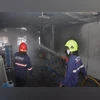As the temperature rises during summer, the threat of hospital fires increases accordingly. To tackle the issue, the Union Ministry of Health and Family Welfare and the National Disaster Management Authority (NDMA) on Saturday issued a joint advisory to all states and union territories (UTs) to prevent potential hospital fires during the summer months.
In a joint letter addressed to chief secretaries of all states and UT administrations, health secretary Apurva Chandra and member and head of department (HOD), NDMA, Kamal Kishore, emphasised that hospital fires can become a significant threat in the face of escalating temperatures.
The health secretary requested the state health departments and state disaster management authorities to work in collaboration to ensure that all accredited hospitals in their jurisdictions immediately undertake thorough inspections and address discrepancies in electrical load audits.
The letter enclosed a detailed set of instructions outlining the measures to be taken by hospitals to ensure fire safety compliance. The directives include staff training, fire safety drills and routine inspection, maintenance and testing of fire safety equipment such as fire extinguishers, hydrants, and alarms.
More From This Section
“All hospitals should also annually renew valid fire no objection certificates (NOCs) and other compliances from respective state fire departments”, the joint advisory said.
The advisory also instructed all hospitals to implement strict no-smoking policies and controls on heat sources in areas with oxygen tanks or piped oxygen. Hospitals should also regularly review and update their infrastructure to comply with the latest fire safety standards outlined in the National Building Code, 2016.
Hospitals have been asked to prioritise recalibration of electrical loads in older buildings before adopting fire safety norms to prevent electrical fires.
The joint advisory noted that safety of the patients and the integrity of healthcare facilities should be of paramount importance. “Therefore, all state and UT administrations are urged to conduct follow-up reviews and ensure strict implementation of these critical safety measures”, it said.

)
